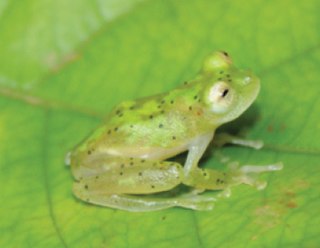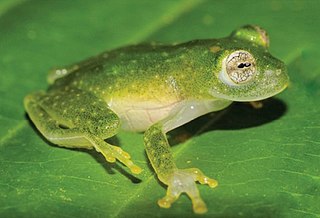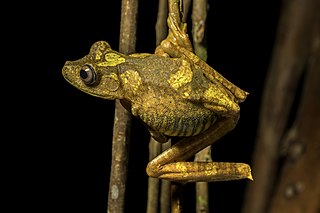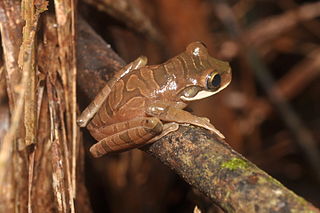
Osteocephalus is a genus of frogs, the slender-legged tree frogs, in the family Hylidae found in the Guianas, the Amazon Basin, Venezuela, Colombia, southeastern Brazil, and north-eastern Argentina. Males are warty, while females are smooth.
Oscaecilia zweifeli is a species of caecilian in the family Caeciliidae. It is a poorly known species only known from few specimens: the holotype from the imprecise type locality, "a small creek tributary to Río Mazaruni" in Guyana, one from similarly imprecise Cayenne in French Guiana, and another one from the Nouragues research station in French Guiana. The specific name zweifeli honors Richard G. Zweifel, an American herpetologist. Common names Zweifel's caecilian and tributary caecilian have been coined for it.
Vitreorana gorzulae is a species of frog in the family Centrolenidae. It is found in Bolívar state in Venezuela and in Guyana. In Spanish it is known as ranita de cristal de Gorzula. Its natural habitats are subtropical or tropical moist montane forests, rivers, and intermittent rivers.
Vitreorana helenae is a species of frog in the family Centrolenidae. Two common names are sometimes used to refer to this species: Venezuelan glass frog and Helena's glass frog. In Spanish, it is locally known as ranita de cristal de Helena.

Hyalinobatrachium iaspidiense is a species of frog in the family Centrolenidae from South America. Its specific name refers Quebrada de Jaspe, its type locality.

Hyalinobatrachium taylori is a species of frog in the family Centrolenidae. Its common name is Taylor's glass frog, and in Spanish, ranita de cristal de Taylor. It may represent at least two distinct species.

Osteocephalus helenae is a species of frog in the family Hylidae. It is widely distributed in the Amazon Basin and is known from the lowlands of Bolivia, Peru, Brazil, Colombia, Venezuela, Guyana, and French Guiana. The specific name helenae honors Helen Beulah Thompson Gaige, an American herpetologist. Common name Helena's [sic] treefrog has been proposed for it.
Warren's tree frog is a species of frog in the family Hylidae found in Guyana and possibly Brazil and Venezuela. Its natural habitats are subtropical or tropical moist montane forests, rivers, freshwater marshes, and intermittent freshwater marshes.

The map tree frog is a species of frog in the family Hylidae found in Bolivia, Brazil, Colombia, Ecuador, French Guiana, Guyana, Peru, Suriname, Trinidad and Tobago, and Venezuela. Its natural habitats are subtropical or tropical dry forests, subtropical or tropical moist lowland forests, moist savanna, subtropical or tropical seasonally wet or flooded lowland grassland, rivers, freshwater lakes, intermittent freshwater lakes, freshwater marshes, plantations, rural gardens, heavily degraded former forests, ponds, and aquaculture ponds. It was previously known as Hyla geographica. The name comes from the reticulated map-like patterns on its eyelids (palpebrum). The black tadpoles congregate in dense clusters in ponds or other calm waters.
The Lema tree frog is a species of frog in the family Hylidae found in Guyana, Venezuela, and possibly Brazil. Its natural habitats are subtropical or tropical moist lowland forests, subtropical or tropical moist montane forests, rivers, pastureland, rural gardens, heavily degraded former forests, aquaculture ponds, and canals and ditches. It is threatened by habitat loss.
Hoogmoed's tree frog is a species of frog in the family Hylidae found in Guyana, possibly Brazil, and possibly Venezuela. Its natural habitats are subtropical or tropical moist montane forests and rivers.
Lysapsus laevis is a species of frog in the family Hylidae found in southwestern Guyana and adjacent northern Brazil. Common name Guyana harlequin frog has been coined for this species.
Nesorohyla is a monotypic genus of frogs in the family Hylidae. The sole species is Nesorohyla kanaima, also known as the Kanaima treefrog. It is endemic to Guyana. and possibly Brazil and Venezuela. Its natural habitats are subtropical or tropical moist lowland forests, subtropical or tropical moist montane forests, and rivers.

Henle's slender-legged tree frog is a species of frog in the family Hylidae. It is found in Peru and northeastern Bolivia. It occurs in lowland, premontane, and montane forest at elevations of 300–1,100 m (980–3,610 ft) above sea level. Breeding takes place in small streams where the tadpoles develop. It is a locally abundant species that can be threatened by habitat loss in parts of its range.
Tepuihyla exophthalma is a species of frog in the family Hylidae. It is native to Guyana and Venezuela in South America.

Osteocephalus mutabor is a species of frogs in the family Hylidae found on the western Andean foothills of Ecuador and south to Ucayali Region of Peru. Before Osteocephalus mutabor was described as a new species in 2002, it was confused with Osteocephalus leprieurii.

The Manaus slender-legged tree frog, also known as the giant broad-headed tree frog, is a species of frog in the family Hylidae found in Bolivia, Brazil, Colombia, Ecuador, French Guiana, Guyana, Peru, Suriname, and Venezuela. Its natural habitats are subtropical or tropical dry forest, subtropical or tropical moist lowland forest, moist savanna, rivers, intermittent freshwater marshes, and canals and ditches. It is threatened by habitat loss. It is also reported to produce bufotenin.

Adenomera andreae is a species of frog in the family Leptodactylidae.
Stefania ayangannae is a species of frog in the family Hemiphractidae. It is endemic to Guyana where it is known from Mount Ayanganna and Mount Wokomung, both in the Pacaraima Mountains.
The Arrabal's Suriname toad is a species of frog in the family Pipidae found in Brazil, Guyana, Suriname, Venezuela, and possibly Peru. Its natural habitats are subtropical or tropical moist lowland forests, freshwater marshes, intermittent freshwater marshes, ponds, and canals and ditches. It is threatened by habitat loss.










